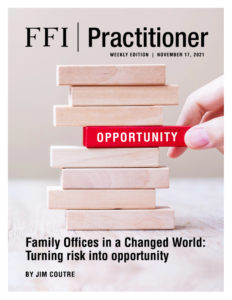
View this edition in our enhanced digital edition format with supporting visual insight and information.
Thank you to this week’s contributor, Jim Coutre, for continuing FFI Practitioner’s November series of editions on topics related to the family office. In Jim’s article, he explores the impact of the pandemic and other recent economic and social unrest on family offices and highlights several opportunities to strengthen family offices in the post-pandemic world.
We have all changed in some way since the outbreak of COVID-19. In addition to a pandemic, we’ve been impacted by inequity, social unrest, polarization, a challenge to American democracy, and even extreme weather. The changes may be obvious or still emerging, but they need to be reckoned with.
While there is desire to get back to the comforts of “normal,” the fact remains that our 2021 families are not the same as our 2019 families. The same holds true for family office employees. To recreate or revert to a 2019 family office could be harmful to the family because it would not reflect the reality of today. It would be a lost opportunity—a missed catalyst for evolving the family office to better align with the family’s new and emerging needs, priorities, and vision for success.
By taking time to reflect on what has changed within our families and our offices and on what new risks those changes have created, family offices can uncover new opportunities to help their families and teams truly thrive.
Family members and employees have changed
Across hundreds of conversations with family offices since early 2020, several changes were repeatedly identified:
- An increased awareness of one’s place in the world, typically presented as recognition of privilege but also including reflection on the impact one has—or can have—on others
- An increased awareness of one’s mortality
- A new dedication to seeking simplicity and happiness, and to living a more intentional life
- A willingness to toss out old assumptions; a desire to learn and grow from the experience
- A realization that work can be built around life, rather than life needing to be built around work
- An increased empathy for others or a decreased tolerance for others
While the majority of changes surfaced by family offices reflect a certain positivity, it was also recognized that they have created new risks to the family and the family office.
- Conflicting values, world views, and priorities within the family
The risk to the family, from within the family, is high. This risk can be seen in the increased number of conversations with family enterprise stakeholders who feel compelled to tear down the economic and political systems in which their wealth was created. Conflicting ideas within families can escalate to infighting. Perhaps less dramatic but no less destructive to a family enterprise is when conflict drives family members to disengage from the family system in protest or to disassociate. - Greater engagement by more family members, which introduces complexity and conflict simply by increasing the number of opinions
When voices multiply, even if tempered, family systems can be strained and governance tested. A fifth-generation timber family provides an example. Young family members, when looking for levers of change to address systemic inequality in the US, flooded long-ignored discussions of land use policies, to the shock and frustration of family leadership. - Refusal of older generation to relinquish control
In recognition of their mortality or in pushback to what they see as the “woke” revolution, many older generation members have dug in their heels, resistant to changing with the world around them or resistant to sharing decision-making power with an “immature” rising generation. This resistance has some in the rising generation questioning the relevancy and long-term viability of their offices. - Increased tension within the family office
As the priorities, expectations, and demands of many employees have changed, more disconnect grows between employees and the family office leadership struggling to understand which shifts are momentary and which are here to stay. Leadership is also stressed by the potential long-term implications for recruiting and retaining a talent pool that is responding to the traditional incentives in unfamiliar ways.Even among coworkers, strains on communication, collaboration, and community have been taking their toll, lowering efficiency, satisfaction, and sense of belonging.
Risks can signal opportunities
By flipping these risks on their heads, they can reveal opportunities to evolve and strengthen a family office:
Opportunity #1: Embrace the friction and engage
Competing or conflicting ideas can be leveraged as a catalyst for dialogue, learning, and ultimately evolution. Rather than avoiding uncomfortable or risky conversations in the hopes of avoiding disruption, offices can recognize that disruption is already here. Creating a space to engage with new or dissenting ideas can be dicey and can indeed alienate family members, but it is the opposite of apathy and disengagement—which are no less dangerous to the long-term health of family enterprises. A family office will not stay relevant by staying still.
Some family offices have embraced the friction only because the fight was taken to them by passionate family members. Other offices are not embracing the friction because they are in denial about its existence. In one seventh-generation office, for example, the elders’ continual dismissal of simmering “preposterous” insinuations from the rising generation eventually boiled into heated conflict with the rising generation’s accusations of outright racism. Luckily, the elders collected themselves and listened authentically, which allowed both generations to work together to create new policies, such as in the hiring process for investments managers.
Opportunity #2: Engage and develop the younger generation
The early days of the pandemic created a bit of a phenomenon where rising generation family members in their twenties and thirties found themselves quarantining with their parents. This created a new dynamic in many families where parents learned to see their children not as “kids,” but as smart, high-functioning adults. This new-found perspective, along with the adoption of videoconferencing, which makes it easier for geographically dispersed families to communicate and work together, have helped break down some of the hierarchies within the family system that had kept the generations from sharing ideas and truly being able to hear one another.
New opportunities in many families have emerged to discuss topics like family decision-making or goals for social and environmental change. The rising generation is more often challenging the status quo by asking, “What is the point of our family’s wealth?” and “What is the purpose of being a family?” Questions such as these can indicate a readiness and willingness of the rising generation to learn more about the family enterprise and to empower themselves by building new knowledge and skills—making it a great time to “resource-up” younger family members.
Opportunity #3: Rethink your family office with a “start from scratch” mentality
So much of what we thought we knew has been turned on its head. Within the office, we thought we knew how things needed to be run, where people needed to work, and what approaches would surely result in doom. Within the family, we thought we knew what we needed an office for, how it had to be staffed, and what overarching vision of success it was supporting.
The post-pandemic family will of course still have legal, tax, investing, and reporting needs. But is there anything they’ve learned about themselves that might also suggest new or different ways the office could support the family?
One multi-generational family office asked itself just that question in the early days of the pandemic and recrafted its role as a family connector. Another family realized they didn’t need the bricks and mortar they once thought they couldn’t live without. Many offices have taken more modest steps to streamline processes, eliminate all paper, or rethink individual roles. But might there be other roles the office can play for the family? Might there be better ways to deliver on family needs?
Opportunity #4: Realign with employees
Many family office professionals were emboldened when the belief that employees need to be at their desk all day, every day to be productive was debunked. Simultaneously, many professionals are becoming more courageous in their desires “to make work, work for them.” The family office space is certainly not immune to the broader cultural shift towards building work around employee’s lives, rather than the other way around.
Offices that are ahead of curve in understanding how their employees have changed, and that are thus seeking insight into how the job markets for family office professionals are reshaping, will be better positioned to attract and hold talent they need. While some offices’ executives may struggle with family members who have not budged in their opinions around worker flexibility, there are enough emerging stories and data points to now make an argument that employees’ demands are less about short-term indulgence and more about a new normal in the competition for top talent.
Conclusion
Families and teams are different than they were in the early days of 2020. By identifying the changes within family offices and uncovering opportunities that those changes create, family offices can better align with their family’s vision of success, now and in the future.
Disclaimer: The content provided herein is general in nature and is for informational purposes only. The statements and opinions expressed in this article are those of the author and do not necessarily reflect those of Fidelity Investments. Views are subject to change at any time based upon market or other conditions and Fidelity disclaims any responsibility to update such views.
About the Contributor

Jim Coutre, ACFBA/ACFWA, is vice president of Insights and Connections at Fidelity Family Office Services in Boston. Prior to joining Fidelity, he was a partner at The Philanthropic Initiative (TPI). Jim is a member of the GEN faculty and can be reached at James.Coutre@fmr.com.

View this edition in our enhanced digital edition format with supporting visual insight and information.





